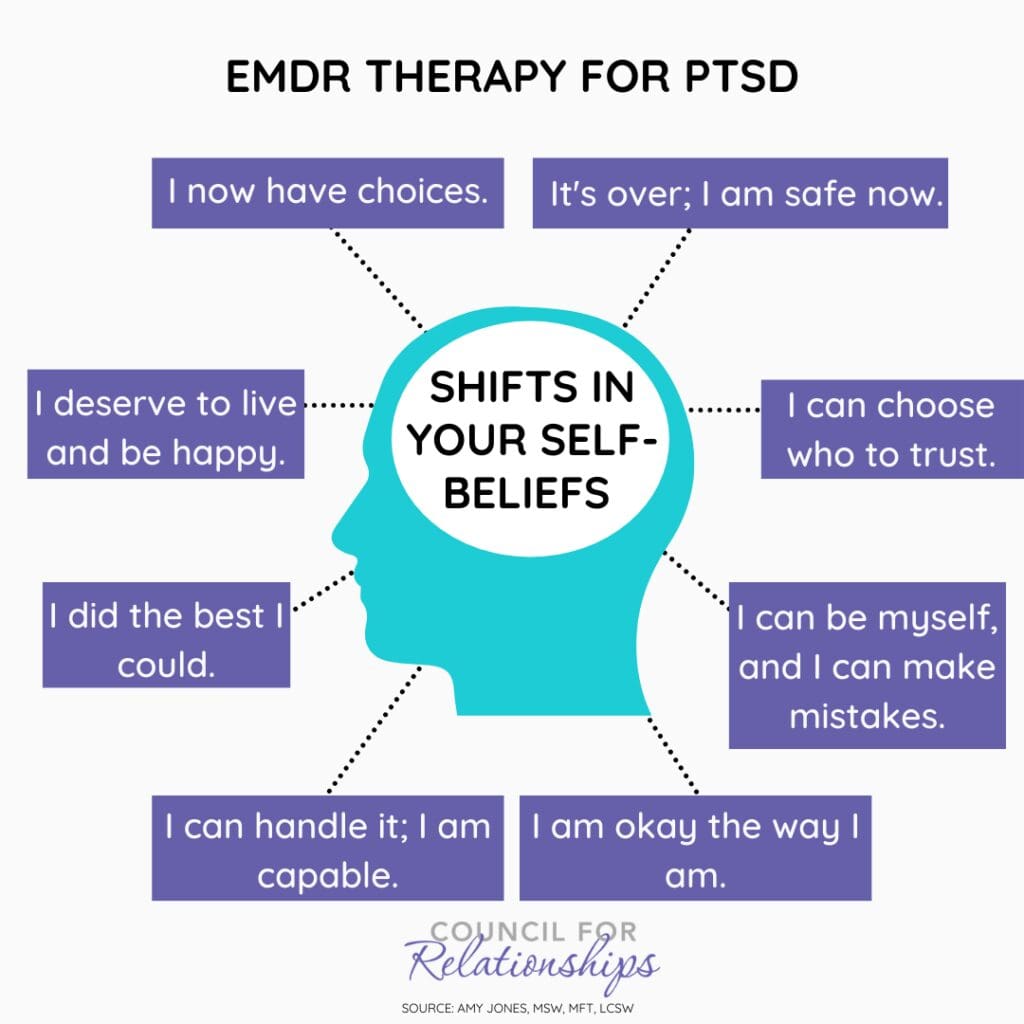EMDR therapy offers methods for strengthening emotional health
Wiki Article
Recognizing EMDR Treatment: Discovering Its Benefits and Benefits for Mental Health
EMDR treatment has become a remarkable approach in the domain name of psychological health, particularly for those facing injury. Its structured technique of handling traumatic memories sets it aside from standard treatments. The possible renovations it supplies for various emotional challenges require closer assessment. As individuals look for efficient options for their psychological health, comprehending the subtleties of EMDR might supply essential understandings right into its advantages and applications. What exists underneath its healing pledge?What Is EMDR Treatment?
Eye Motion Desensitization and Reprocessing (EMDR) therapy is a structured method developed to reduce the distress related to terrible memories. Developed by Francine Shapiro in the late 1980s, EMDR integrates components of cognitive-behavioral treatment with bilateral stimulation, generally through guided eye activities - emdr therapy new york. The therapy intends to aid individuals process and reframe stressful experiences, lowering their psychological fee and impact on lifeThroughout EMDR sessions, clients remember traumatic memories while concurrently participating in specific reciprocal stimulation strategies. This double focus is thought to assist in the brain's all-natural healing procedures, permitting the integration of interfered with memories. EMDR is typically employed to deal with conditions like post-traumatic stress condition (PTSD), anxiety, and clinical depression. Its organized nature and adaptable structure make EMDR easily accessible to a diverse variety of clients, using hope and remedy for the worries of unresolved injury.
The Science Behind EMDR
Recognizing the mechanisms underlying EMDR treatment reveals an interesting interaction between emotional processes and neurological actions. Research suggests that EMDR activates the mind's information handling system, facilitating the combination of traumatic memories. This process shows up to involve the bilateral excitement generally used in EMDR, which can assist re-shape neural pathways related to traumatic experiences.Studies have revealed adjustments in brain activity patterns during EMDR sessions, specifically in locations connected to emotional guideline, such as the amygdala and prefrontal cortex. These adjustments suggest that EMDR may decrease the psychological cost of stressful memories, consequently permitting people to process their experiences much more adaptively.
Furthermore, neuroimaging research studies highlight changes in the default setting network, which might contribute in how individuals connect to their memories. Generally, the clinical expedition of EMDR highlights its possible efficiency in advertising psychological health via an intricate communication of neurological and cognitive devices.
Just How EMDR Functions: The Refine Explained
While several healing strategies concentrate on spoken handling, EMDR utilizes an unique technique that integrates bilateral stimulation to facilitate healing. The procedure starts with the specialist assisting the client identify distressing memories or ideas. As soon as these targets are developed, the therapist guides the customer via a collection of eye motions or other forms of reciprocal excitement, such as tapping or auditory signs. This stimulation is believed to aid in refining the memories, enabling the brain to recycle distressing experiences much more adaptively.Throughout the sessions, clients might experience a series of emotions and insights as they challenge their memories. The therapist maintains an encouraging atmosphere, making sure the customer feels risk-free during the process. After the stimulation, the therapist aids the client assess any kind of adjustments in their feelings or ideas relating to the targeted memories. This structured approach intends to decrease the psychological fee connected with injury, promoting a much healthier mindset.
Advantages of EMDR for Trauma Recuperation
EMDR therapy offers considerable benefits for people recovering from trauma. It helps with an increased healing procedure, helping customers procedure distressing memories more effectively. In addition, it lowers emotional distress and boosts coping abilities, equipping people to manage their experiences much more properly.Accelerated Healing Refine
As people seek efficient approaches for conquering injury, the increased healing process provided by EMDR therapy attracts attention as a transformative strategy. Unlike standard restorative strategies that may take years to produce outcomes, EMDR facilitates fast handling of stressful memories. This method enables customers to challenge and incorporate unpleasant experiences in an organized fashion, frequently causing breakthroughs within a few sessions. The reciprocal excitement inherent in EMDR assists to desensitize people to traumatic memories, advertising a sense of safety and control. As a result, customers frequently report considerable reductions in trauma-related signs. By accelerating the recovery trip, EMDR equips people to recover their lives and move on with restored strength and hope, making it a beneficial alternative for injury healing.Minimized Emotional Distress
Emotional relief becomes attainable through the application of EMDR treatment in injury recuperation. This healing approach helps with the processing of distressing memories, which typically contribute to frustrating psychological distress. By utilizing bilateral stimulation, EMDR allows clients to access and reframe stressful experiences, lowering their psychological fee. As people engage with their memories in a safe environment, they might experience a substantial reduction in anxiety, anxiety, and fear connected with past injuries. Additionally, EMDR promotes a feeling of safety and empowerment, permitting individuals to face their feelings without coming to be overloaded. As an outcome, clients typically report an improved emotional state, cultivating resilience and a much more well balanced perspective on their lives. This decrease in psychological distress is a vital benefit of EMDR therapy.Boosted Coping Abilities
While injury can leave individuals really feeling vulnerable, EMDR treatment furnishes them with enhanced coping skills that promote durability and personal growth. By Extra resources attending to the source of distress, EMDR helps clients determine and create reliable strategies to manage their emotional reactions. These dealing abilities consist of mindfulness, basing strategies, and psychological law, which encourage people to browse tough scenarios with better ease. As customers proceed via EMDR treatment, they learn to reprocess terrible memories, transforming their perceptions and decreasing feelings of stress and anxiety and vulnerability. This newfound capability to cope not only aids in injury recuperation yet likewise improves general mental health, bring about boosted partnerships and a much more satisfying life. Ultimately, EMDR fosters a feeling of company that supports long-term psychological health and wellness.EMDR and Its Efficiency for Anxiety and Clinical depression
EMDR treatment operates on the principle of reciprocal stimulation, which may aid clients process and reframe distressing memories connected to stress and anxiety and depression. Study suggests promising professional success rates, suggesting that EMDR can be a reliable intervention for these mental wellness conditions. Recognizing the underlying mechanisms and results of EMDR offers understanding into its therapeutic capacity.Mechanism of EMDR
Countless research studies have actually demonstrated the performance of Eye Motion Desensitization and Reprocessing (EMDR) therapy in treating stress and anxiety and depression. The device of EMDR entails bilateral stimulation, commonly via assisted eye motions, which assists in the handling of stressful memories. This twin focus permits individuals to reprocess traumatic experiences while preserving a concentrate on the present, reducing emotional disturbance. EMDR aims to incorporate fragmented memories, diminishing their unfavorable psychological influence. Through structured stages, the treatment helps clients reframe their understandings, cultivating flexible beliefs about themselves. This process not just alleviates signs of stress and anxiety and clinical depression but also improves psychological law, bring about improved mental wellness. In general, EMDR's distinct technique uses a comprehensive framework for healing mental distress.
Clinical Success Prices
Research study shows that EMDR treatment has revealed amazing success prices in easing symptoms of anxiousness and anxiety. Numerous research studies have actually demonstrated that people going through EMDR often experience considerable reductions in stressful symptoms within a fairly short duration. As an example, a meta-analysis disclosed that EMDR is as effective as standard cognitive-behavioral treatment for treating both stress and anxiety and depression. On top of that, some people report improvements after just a couple of sessions. EMDR's performance is attributed to its special strategy, which helps reprocess distressing memories, bring about lowered emotional distress. Clients often reveal high satisfaction with their treatment results, keeping in mind boosted psychological law and overall well-being. This evidence supports EMDR's expanding acknowledgment as a useful restorative choice for psychological wellness professionals.Locating an EMDR Specialist: What to Consider
When looking for an EMDR therapist, what key variables should one think about to assure an excellent fit? Initially, it is important to confirm the specialist's certifications and qualifications, ensuring they are educated particularly in EMDR treatment. This training should be backed by acknowledged certifications from credible organizations
Next, take into consideration the therapist's experience, especially with situations comparable to one's own. Different specialists might have varying areas of focus and proficiency, which can considerably influence the therapeutic process.
One more vital facet is the therapist's method and style. A great relationship and convenience degree in between the customer and therapist are vital for efficient therapy.
Furthermore, functional factors to consider such as availability, session, and place expenses ought to not be neglected. By very carefully examining these aspects, individuals can make educated options in their pursuit of EMDR therapy, boosting their opportunities for effective psychological wellness outcomes.
Frequently Asked Questions
Can EMDR Treatment Be Made Use Of for Kids and Teenagers?
Yes, EMDR treatment can be successfully utilized for teens and kids. Research study indicates that it assists in refining terrible experiences, helping more youthful individuals develop dealing methods and improve psychological guideline in a helpful environment.How much time Does an EMDR Treatment Session Normally Last?
An EMDR therapy session typically lasts in between 60 to 90 minutes. The period may differ based on healing goals and specific demands, websites ensuring that each session properly deals with the client's specific experiences and challenges.Is EMDR Treatment Covered by Insurance Policy Strategies?
EMDR treatment insurance coverage differs by insurance coverage strategy. Some strategies include it as part of mental health benefits, while others might get more require specific criteria to be satisfied. People must consult their insurance coverage supplier for in-depth information.Are There Any Side Impacts of EMDR Therapy?

The Number Of Sessions of EMDR Treatment Are Normally Needed?
Typically, people may call for anywhere from six to twelve sessions of EMDR therapy, relying on the complexity of their injury and personal progression (emdr therapy). Some might require added sessions for much deeper problems or ongoing assistanceEye Movement Desensitization and Reprocessing (EMDR) therapy is an organized approach designed to ease the distress associated with stressful memories. Emotional alleviation becomes obtainable via the application of EMDR therapy in injury recovery. As clients proceed through EMDR therapy, they find out to recycle terrible memories, changing their perceptions and decreasing sensations of anxiety and helplessness. EMDR treatment runs on the concept of bilateral stimulation, which might aid patients process and reframe stressful memories connected to anxiety and depression. EMDR therapy might lead to short-lived side effects such as enhanced emotional distress, brilliant memories, or physical pain throughout sessions.
Report this wiki page